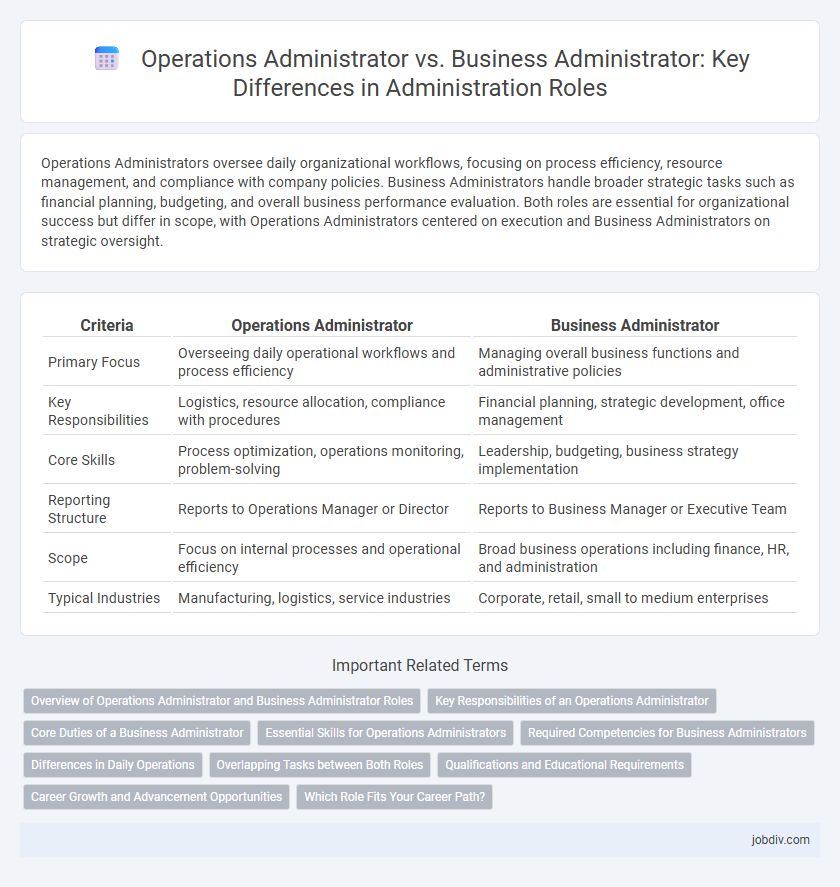Operations Administrators oversee daily organizational workflows, focusing on process efficiency, resource management, and compliance with company policies. Business Administrators handle broader strategic tasks such as financial planning, budgeting, and overall business performance evaluation. Both roles are essential for organizational success but differ in scope, with Operations Administrators centered on execution and Business Administrators on strategic oversight.
Table of Comparison
| Criteria | Operations Administrator | Business Administrator |
|---|---|---|
| Primary Focus | Overseeing daily operational workflows and process efficiency | Managing overall business functions and administrative policies |
| Key Responsibilities | Logistics, resource allocation, compliance with procedures | Financial planning, strategic development, office management |
| Core Skills | Process optimization, operations monitoring, problem-solving | Leadership, budgeting, business strategy implementation |
| Reporting Structure | Reports to Operations Manager or Director | Reports to Business Manager or Executive Team |
| Scope | Focus on internal processes and operational efficiency | Broad business operations including finance, HR, and administration |
| Typical Industries | Manufacturing, logistics, service industries | Corporate, retail, small to medium enterprises |
Overview of Operations Administrator and Business Administrator Roles
Operations Administrators oversee daily organizational processes, ensuring workflow efficiency, resource allocation, and compliance with company policies. Business Administrators focus on strategic planning, financial management, and coordinating between different departments to support business growth and sustainability. Both roles require strong organizational skills, but Operations Administrators emphasize operational execution while Business Administrators prioritize broader business objectives.
Key Responsibilities of an Operations Administrator
Operations Administrators manage daily organizational processes, ensuring efficient workflow, resource allocation, and adherence to company policies. They coordinate cross-departmental activities, supervise staff performance, and handle logistics to optimize operational productivity. Key responsibilities include process improvement, inventory control, and compliance monitoring to support business objectives.
Core Duties of a Business Administrator
A Business Administrator primarily oversees financial management, strategic planning, and resource allocation to ensure organizational efficiency and profitability. Core duties include budgeting, policy development, and coordinating cross-departmental projects to support business goals. Expertise in performance analysis and compliance monitoring is essential for driving sustainable growth and organizational success.
Essential Skills for Operations Administrators
Operations Administrators excel in process optimization, workflow management, and resource allocation to ensure seamless daily functions within organizations. Key skills include proficiency in project management software, strong analytical abilities to identify inefficiencies, and effective communication for coordinating cross-departmental tasks. Mastery of data analysis and time management tools further distinguishes Operations Administrators in streamlining operational activities.
Required Competencies for Business Administrators
Business Administrators require strong financial acumen, strategic planning abilities, and effective communication skills to manage organizational resources and drive business growth. Proficiency in project management, data analysis, and leadership is essential to coordinate cross-functional teams and optimize operational efficiency. Mastery of regulatory compliance and risk management principles further ensures sustainable business performance.
Differences in Daily Operations
Operations Administrators focus on managing day-to-day workflow, coordinating resources, and ensuring efficient process execution within departments. Business Administrators handle broader strategic functions, including financial planning, policy implementation, and overall organizational management. The key difference lies in Operations Administrators emphasizing operational efficiency, while Business Administrators drive business strategy and administration.
Overlapping Tasks between Both Roles
Operations Administrators and Business Administrators both manage daily administrative functions, including coordinating schedules, handling communications, and maintaining records. They oversee resource allocation and support project management to ensure smooth workflow and operational efficiency. Both roles require strong organizational skills and the ability to collaborate across departments to meet organizational goals.
Qualifications and Educational Requirements
Operations Administrators typically require a bachelor's degree in business administration, operations management, or a related field, alongside skills in process optimization and project management. Business Administrators often hold degrees in business administration, finance, or marketing, with a strong foundation in strategic planning, financial analysis, and organizational leadership. Certifications such as PMP for Operations Administrators and CPA or MBA for Business Administrators enhance qualifications and career prospects in their respective domains.
Career Growth and Advancement Opportunities
Operations Administrators specialize in streamlining company processes, offering career growth through roles like Operations Manager or Director of Operations with a focus on efficiency and resource management. Business Administrators gain broad exposure to company strategy and financial management, advancing to positions such as Business Development Manager, General Manager, or C-level roles in finance and administration. Career advancement for both paths depends on gaining industry-specific expertise, leadership skills, and cross-functional knowledge to secure higher managerial or executive positions.
Which Role Fits Your Career Path?
Operations Administrators excel in streamlining process efficiency and managing daily organizational workflows, making them ideal for careers centered on logistics and resource coordination. Business Administrators focus on financial planning, strategic decision-making, and overall business growth, suitable for those aiming at leadership roles in corporate management. Choosing between these roles depends on whether your career path is oriented towards operational execution or comprehensive business strategy.
Operations Administrator vs Business Administrator Infographic

 jobdiv.com
jobdiv.com